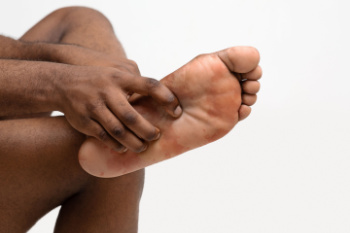
Plantar fasciitis is a frequent cause of heel pain that affects the thick band of tissue, known as the plantar fascia, which runs along the bottom of the foot. Pain is usually most noticeable during the first few steps after waking or after long periods of inactivity, but can also worsen with prolonged standing or walking. Discomfort occurs from microtears at the point where the plantar fascia connects to the heel bone, triggering inflammation. Risk factors for plantar fasciitis include excessive standing, increased body weight, aging, a sudden change in activity level, or tight calf muscles. A podiatrist can help by assessing your foot mechanics, recommending specific stretches for the calf and plantar fascia, and suggesting modifications in footwear and activity levels to reduce stress on the affected area. In most cases, non-surgical treatment is effective in relieving symptoms and improving function. If you have heel pain that may be caused by plantar fasciitis, it is suggested that you schedule an appointment with a podiatrist.
Plantar fasciitis is a common foot condition that is often caused by a strain injury. If you are experiencing heel pain or symptoms of plantar fasciitis, contact one of our podiatrists from Active Foot and Ankle Care, LLC. Our doctors can provide the care you need to keep you pain-free and on your feet.
What Is Plantar Fasciitis?
Plantar fasciitis is one of the most common causes of heel pain. The plantar fascia is a ligament that connects your heel to the front of your foot. When this ligament becomes inflamed, plantar fasciitis is the result. If you have plantar fasciitis you will have a stabbing pain that usually occurs with your first steps in the morning. As the day progresses and you walk around more, this pain will start to disappear, but it will return after long periods of standing or sitting.
What Causes Plantar Fasciitis?
- Excessive running
- Having high arches in your feet
- Other foot issues such as flat feet
- Pregnancy (due to the sudden weight gain)
- Being on your feet very often
There are some risk factors that may make you more likely to develop plantar fasciitis compared to others. The condition most commonly affects adults between the ages of 40 and 60. It also tends to affect people who are obese because the extra pounds result in extra stress being placed on the plantar fascia.
Prevention
- Take good care of your feet – Wear shoes that have good arch support and heel cushioning.
- Maintain a healthy weight
- If you are a runner, alternate running with other sports that won’t cause heel pain
There are a variety of treatment options available for plantar fasciitis along with the pain that accompanies it. Additionally, physical therapy is a very important component in the treatment process. It is important that you meet with your podiatrist to determine which treatment option is best for you.
If you have any questions, please feel free to contact our offices located in Fair Lawn, Riverdale, and Englewood, NJ . We offer the newest diagnostic and treatment technologies for all your foot care needs.






